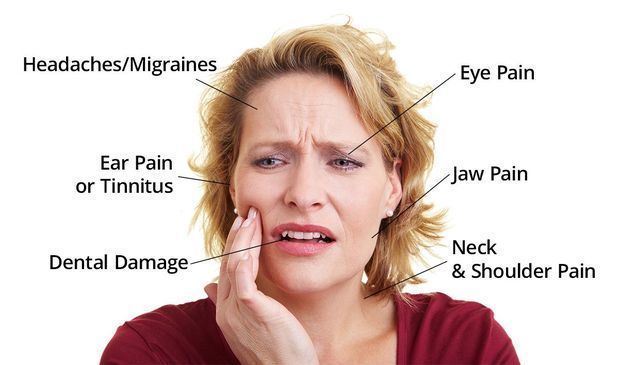Are You Struggling with Jaw Pain or Stiffness?
TMJ disorders (TMD), also referred to as temporomandibular joint disorders, are conditions that affect the jaw joint and the surrounding muscles, often causing significant pain and discomfort. TMD can impact your ability to chew, speak, or even move your jaw. Common symptoms include jaw pain, facial pain, headaches, and neck aches.
If you’re experiencing these issues, relief is closer than you think. Contact our Wilmington, DE, dental office at (302) 999-7600 or our Seaford, DE, dental office at (302) 536-7589 today to schedule an evaluation. We welcome patients in Wilmington, Seaford, and the surrounding Delaware areas for quality dental care near them.
What Is the TMJ?
The temporomandibular joint (TMJ) connects your jawbone (mandible) to the temporal bone of your skull. This complex joint combines hinge and sliding motions, enabling essential activities like chewing, speaking, and yawning. Surrounding the TMJ are muscles, ligaments, and soft tissues that control jaw movement. When these components are compromised, temporomandibular joint dysfunction (TMD) can occur, leading to pain and restricted motion.
Types of TMJ Disorders
TMJ disorders manifest in various ways, each with unique causes and symptoms:
- Myofascial Pain Disorder: The most common form of TMD, characterized by pain in the chewing muscles. Stress, overuse, or trauma often contribute to this condition.
- Internal Joint Derangement: This occurs when the disc cushioning the TMJ becomes displaced or dislocated, leading to painful clicking or popping sounds and limited jaw movement.
- Degenerative Joint Disease: Often caused by arthritis or aging, this condition leads to cartilage wear in the TMJ, resulting in pain and restricted jaw movement.
- TMJ Ankylosis: A rare but severe condition where the jaw joint becomes fused, preventing normal jaw function. This can be due to trauma, infection, or specific medical conditions.
Common Causes of TMD in Wilmington and Seaford
While the exact cause of TMD varies, several factors can contribute to its development:
- Jaw injuries such as whiplash or trauma
- Teeth grinding (bruxism) or jaw clenching
- Arthritis or other inflammatory joint diseases
- Stress and muscle tension in the jaw or face
- Poor posture, particularly in the neck and shoulders
- Genetic predisposition or anatomical irregularities
Why Choose Brown and Baran Family Dentistry for TMJ Therapy?
At Brown and Baran Family Dentistry, Dr. Paul Brown and Dr. Chris Baran offer specialized care for TMJ disorders that combines advanced diagnostics with personalized treatment plans. Our doctors have extensive training in temporomandibular joint dysfunction, helping countless Delaware residents find relief from jaw pain, headaches, and related symptoms. Using state-of-the-art technology at our Wilmington and Seaford locations, we precisely evaluate your jaw mechanics and bite alignment to identify the root cause of your discomfort.
Our comprehensive approach incorporates custom-fitted oral appliances, therapeutic exercises, and collaboration with specialists when needed. Patients appreciate our compassionate understanding of how TMJ pain impacts daily life and our commitment to non-surgical solutions whenever possible. Choose Brown and Baran Family Dentistry for TMJ therapy that addresses both your immediate pain relief and long-term jaw health.
To schedule your TMJ consultation, call our Wilmington office at (302) 999-7600 or our Seaford location at (302) 536-7589.
Recognizing TMJ Symptoms Near You
TMD symptoms range from mild discomfort to severe, ongoing pain. Common indicators include:
- Jaw pain or stiffness
- Clicking, popping, or grating sounds when moving the jaw
- Headaches, neck aches, or earaches
- Facial pain or swelling
- Difficulty chewing or opening the mouth
If these symptoms are interfering with your daily life, our dental team in Wilmington and Seaford can provide effective treatment options tailored to your needs.
Risk Factors of Developing TMD
Certain factors can increase your likelihood of developing temporomandibular joint disorders:
- Jaw injuries: Trauma from incidents like car accidents or sports can heighten the risk of TMD.
- Teeth grinding or clenching (bruxism): Regular grinding or clenching, often due to stress, puts pressure on the jaw joint and jaw muscles.
- Arthritis or other joint diseases: Conditions causing joint inflammation, like osteoarthritis or rheumatoid arthritis, can lead to TMD.
- Dislocated jaw joint disc: The disc stabilizes the jaw joint; if displaced, it can trigger TMJ symptoms.
- Genetic factors: Some individuals may be genetically inclined to develop TMD.
- Poor posture: Slouching, especially in the neck and shoulders, can cause tension in the jaw muscles.
- Gender: Women are more prone to TMJ disorders than men.
- Age: TMD is more common between ages 20 and 40, but it can occur at any age.
How TMD Is Diagnosed
Diagnosing TMD starts with a detailed medical history and physical examination of your jaw, facial muscles, and TMJ. Additional imaging, such as X-rays, MRIs, or CT scans, may be used to identify structural issues or damage to the joint.
Effective Treatment Options for TMD
Most TMD cases improve with nonsurgical treatments for relieving pain and restoring jaw function. TMD treatment options include:
- Soft foods: Reducing strain on your jaw
- Oral splints or mouthguards: Preventing teeth grinding and clenching
- Jaw exercises and physical therapy: Improving flexibility and strength
- Heat or cold therapy: Alleviating pain and inflammation
- Relaxation techniques: Managing stress to reduce muscle tension
- Medications: Nonsteroidal anti-inflammatory drugs (NSAIDs), muscle relaxants, or prescription medications
For severe symptoms or when conservative treatments aren’t effective, more advanced options may be necessary:
- TMJ injections: Corticosteroids or botulinum toxin (Botox) to ease pain
- Dental corrections: Addressing misaligned teeth or replacing missing teeth
- Surgical procedures: Including TMJ arthroscopy or open joint surgery in extreme cases
Occlusal Splints at Brown and Baran Family Dentistry
The most effective TMJ treatment depends on the cause of your symptoms. One common treatment is an occlusal splint. This custom-fitted oral appliance is worn over the teeth. It gently repositions the jaw to take pressure off the TMJ joints. This provides lasting relief from jaw pain and headaches. Splints also protect teeth from grinding damage.
In more severe cases, your Wilmington and Seaford dentists may recommend restorative dentistry treatment along with a splint. Missing teeth can cause unhealthy TMJ strain. Dental implants or bridges can restore the jaw to full function. We may even use dental crowns to evenly distribute pressure across the bite.
To schedule your TMJ consultation, call our Wilmington office at (302) 999-7600 or our Seaford location at (302) 536-7589.
How Much Does TMJ Treatment Cost?
The cost of TMJ treatment varies depending on the severity of your condition, the type of treatment required, and your location. For patients in Wilmington and Seaford, DE, the average cost of TMJ treatments can range from $200 to $2,000 for conservative, non-surgical options like nightguards, physical therapy, or medications. More advanced procedures, such as injections or TMJ surgery, may cost between $5,000 and $50,000, depending on the complexity of the treatment.
Preventing TMJ Disorders
While not all causes of TMD can be avoided, these steps can reduce your risk:
- Avoid chewing gum and hard or chewy foods
- Practice good posture, especially when sitting at a desk
- Use a nightguard if you grind your teeth
- Seek prompt treatment for jaw pain or stiffness

Frequently Asked Questions
Many of our Delaware patients experience noticeable improvement within 2-4 weeks of beginning treatment at Brown and Baran Family Dentistry. However, complete resolution depends on the severity and underlying cause of your TMJ disorder. Some patients with mild symptoms may find relief almost immediately after starting to wear a custom oral appliance, while those with more complex conditions may require several months of comprehensive care. Dr. Brown and Dr. Baran monitor your progress carefully at both our Wilmington and Seaford offices, making adjustments to your treatment plan as needed. We’re committed to finding solutions that provide both immediate comfort and long-term jaw health.
Many Delaware dental and medical insurance plans provide at least partial coverage for TMJ therapy, particularly for diagnostic services and oral appliances. Coverage varies significantly between providers and specific plans. At Brown and Baran Family Dentistry, our administrative team is experienced in working with insurance companies to maximize your benefits. We can verify your coverage before treatment begins and discuss any potential out-of-pocket expenses.
The process for creating your custom TMJ appliance at our Wilmington or Seaford office typically involves:
- Digital impressions or traditional molds of your teeth
- Precise measurements of your bite relationship
- Design specifications based on your specific TMJ issues
- Fabrication using high-quality, durable materials
- A fitting appointment where Dr. Brown or Dr. Baran ensures perfect fit and comfort
- Adjustments as needed to maximize effectiveness
Unlike over-the-counter options, our custom appliances are precisely engineered to address your unique jaw alignment and muscle function. This personalized approach leads to greater comfort and more effective treatment outcomes for our Delaware patients.
Find Relief Today at Brown and Baran Family Dentistry!
Don’t let TMJ pain affect your quality of life. With the right treatment plan, you can regain comfort and function. For high-quality dental care in Wilmington, Seaford, and surrounding Delaware communities, schedule an appointment today. Call our Wilmington office at (302) 999-7600 or our Seaford office at (302) 536-7589. Let us help you find lasting relief from TMJ pain.



